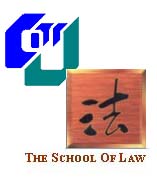International Human Rights Conference brings mighty minds together
Attracting participation from government and inter-governmental organizations, academics and members of non-governmental organizations, the Conference was inaugurated by Honourable Mr Justice Geoffrey Ma, Chief Judge of the High Court, Hong Kong SAR. Professor (Chair) Peter Malanczuk, Dean of CityU’s SLW, delivered the welcome address and Professor D K Srivastava, SLW Professor and Associate Dean, gave the Vote of Thanks. Chairing various sessions were CityU’s Professor (Chair) Wang Gui Guo, Professor Anton Cooray, Dr Lin Feng and Dr Priscilla MF Leung, SLW Associate Dean (External Affairs), and Professor (Chair) Yash P Ghai, from The University of Hong Kong’s Faculty of Law.
Professor Malanczuk observed, "The importance our subject has been made apparent in UN Secretary General Kofi Annan's March 2005 report to the UN General Assembly, entitled, In Larger Freedom: Towards Development, Security and Human Rights for ALL in which he says 'Larger Freedom implies that men and women everywhere have the right to be governed by their own consent, under law, in a society where all individuals can, without discrimination or retribution, speak, worship and associate freely. They must also be free from want, so that the death sentences of poverty and infectious disease are lifted from their lives...' Our Conference is one of many contributions to the discussions and activities related to human rights that are taking place around the world, such as the Conference held by the International Law Association in Berlin last year."
Mr C Raj Kumar, SLW Lecturer and organizer of the Conference, outlined six challenges for the participants' consideration: "The first challenge is theoretical -- there is no real contemporary challenge to the concept of human rights and its relevance for humanity; second, there is continuing resistance in certain parts of the world when it comes to the methods and processes to acheieve the institutionalisation of human rights; third is the challenge posed by poverty, probably the most important human rights and development issue facing developed and developing countries alike; fourth, there is the challenge to governance posed by corruption, which undermines the effective functioning of democratic institutions; the fifth challenge is that of globalisation -- the roles of the IMF, the WTO, multinational corporations and the World Bank; and sixth is the challenge posed by terrorism, underlining the transition from protecting national security to protecting human security. ... It is imperative for the international community to understand the need for focusing on economic, social and cultural rights, thereby accepting a holistic perspective on human rights and development."
Opening the first session, Professor David Kennedy, Manley O Hudson Professor of Law and Director of Harvard Law School's European Law Research Center, described the "unrecognised costs of well-meaning humanitarian ventures... I argue that to be responsible partners in governance, humanitarians should become more pragmatic; they should do more to acknowledge and take responsibility for the costs as well as the benefits of their work."
Ms Stephanie Kleine-Ahlbrandt, Programme Manager, UN Asia Pacific Office of the High Commissioner for Human Rights in Geneva, Switzerland, spoke about relevant challenges and proposals for more effective implementation of a human rights based approach to development, while
Dr Martina Timmerman, Director of Studies on Human Rights and Ethics at the UN University (UNU) in Tokyo, Japan, presented a paper on the "Corporate Business and the Right for Health" as a central part of international political and human rights discussions. She introduced a new UNU project that could serve as a motivating model towards the improvement of women's and girls' opportunities to exercise their "Right for Health".
Professor Mahendra Singh, Visiting Professor at CityU's School of Law and Professor of Law at the University of Delhi, India, highlighted the ways in which some Asian societies grapple with the restoration of human dignity.
Among the other notable guest speakers at the conference were: Professor Sriprapha Petcharamesree, Professor and Director, Office of Human Rights Studies & Social Development, Mahidol University, Thailand; Professor Michael Davis, Robert and Marion Short Visiting Professor of Law at Notre Dame Law School, US, and Professor of Law at Chinese University of Hong Kong; Ms Thusitha Pilapitiya, Consultant, Support to the Establishment of the Afghan Legislature Project, UNDP, Afghanistan; Professor Dong Heping, Professor, Northwest University of Politics and Law, Xian, PRC; and Professor Mo Jihong, Professor of Constitutional Law, Institute of Chinese Academy of Social Sciences, Beijing, PRC.
In addition to supporting CityU's high quality professional education, the School of Law continuously seeks out ways to bolster the University's fresh focus on internationalisation. This Conference represents just one of the SLW's efforts to sustain and enhance CityU's key role and contributions to the Asia-Pacific region and beyond.



